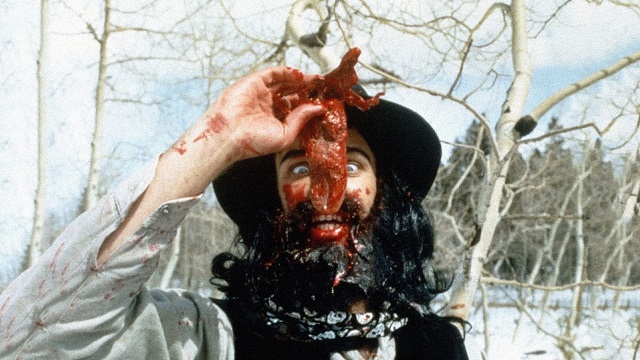It’s been 22 years since Cannibal: The Musical was ignored by the Sundance Film Festival. Trey Parker and Matt Stone submitted their first film, made on a budget of $125,000, and never even received a rejection letter. Instead, they rented conference rooms and papered the town with flyers, attracting the attention of Lloyd Kauffman. Troma snatched up the rights, television and video, for Cannibal: The Musical, releasing it shortly before South Park hit the airwaves.
Cannibal: The Musical is a satire of the true story of Alfred Packer (previously adapted as The Legend of Alfred Packer), a prospector who led a small troupe from Provo, Utah towards Breckinridge, Colorado. Stuck in the mountains during harsh weather, Packer was the only one to survive the journey, confessing to survival-based cannibalism due to harsh weather condition. Parker and Stone’s used this story to take on western-genre clichés, including and especially those of the musical Oklahoma.
The targets identified by Parker and Stone weren’t the usual shot in the dark one-time movie references, but full on tropes founded in American identity. Packer is an over-confident outsider to the Mormon community leading a troupe of greedy self-centered assholes looking to make it to Breckinridge for the gold rush. The troupe is made of the virgin, the idiot, the jerk, Mr. Positive, and the preacher. Along the way, they run into a bunch of butch French fur trappers (the leader is named Frenchy), and a troupe of Japanese Native Americans. When the love of Packer’s life, his horse Leane, goes missing in the first act, he sets off on a quest searching for the horse and her kidnappers, forcing a battle between human and nature.
The satire within Cannibal is so universal that it can still actively inflict its savageness on Oscar-nominated films. The Revenant is a tale of survival and murder told in the Northwestern mountains in the late 1800s. Hugh Glass is an over-confident French outsider to the largely British Isles community leading a troupe of greedy self-centered assholes to some Fort so they can sell their furs. The troupe consists of a sensitive type, a jerk, Mr. Sensitive (who may also be a virgin), the compassionate boss, and a bunch of non-entities. Along the way, they run into a bear, a group of vengeful Native Americans, and another group of fur traders. When the loves of Hugh Glass’s life, his son Hawk and his wife, are murdered in the first act and he’s left for dead, Hugh sets off on a quest of vengeance searching for his son’s murderer forcing a battle between human and nature.
I’m being a little facetious here. Though The Revenant and Cannibal: The Musical share a lot of genre-based DNA, they’re not even close to the same movie (and not just because Cannibal is about an hour shorter). But, if you watch Cannibal before seeing The Revenant, you’ll be mentally putting Fitzgerald in time out for getting in fights with Hugh Glass. You’ll possibly be singing “Let’s Build A Snowman” (easily Cannibal‘s catchiest song), every time people are suffering from the snow and need a pick me up. You may be singing “Ode to Liane,” Parker’s flashback-inspired love song to his horse, whenever Hugh hallucinates his wife.
So, if you haven’t watched Cannibal: The Musical in awhile, you might as well freshen up on the classics.
Cannibal: The Musical is available on Hulu and here on YouTube. You can also pre-order the soundtrack on Vinyl from Banana Stand Records.

